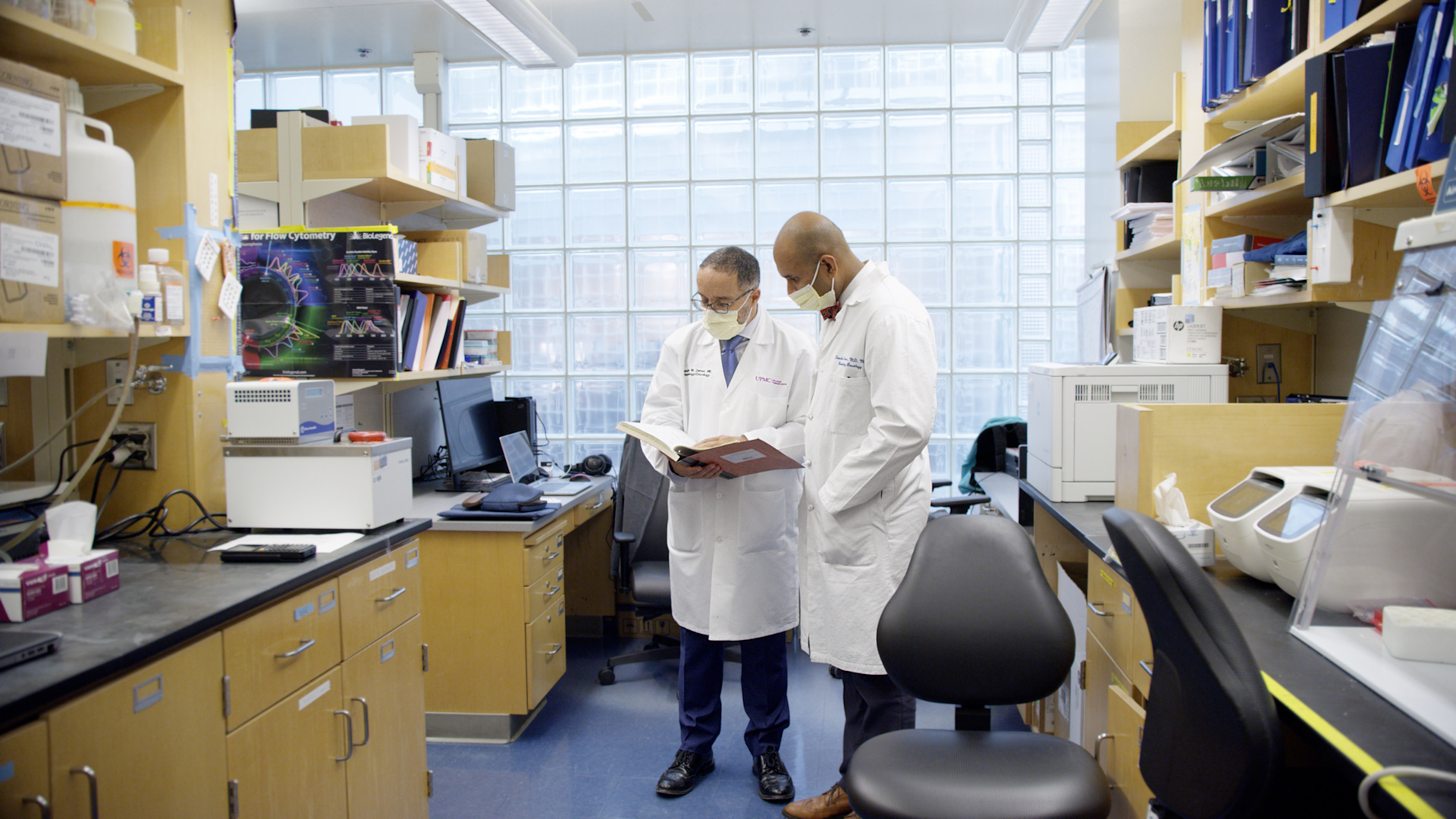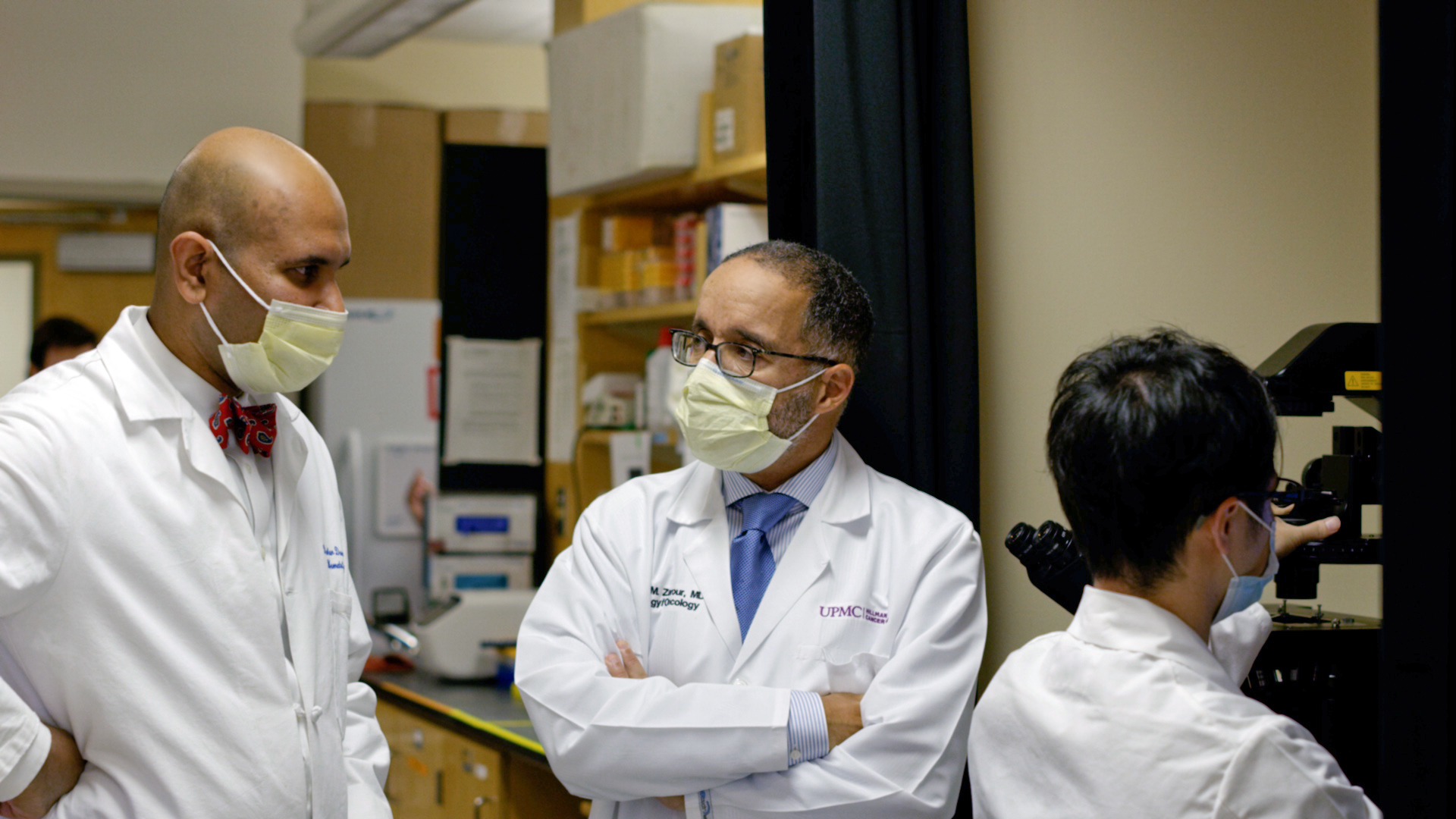Researchers have known that microorganisms in the gut can impact the effectiveness of immunogenic chemotherapies for cancer patients. When studies showed that the same could be true for immune checkpoint inhibitors, it opened the possibility for better treatment options for those who hadn’t responded to immunotherapy. With a 40% failure rate for immunotherapy in advanced melanoma patients, being able to change the treatment response has the potential to affect 20,000 patients each year.

Drs. Davar and Zarour discussing new results in the lab
Diwakar Davar, MD, associate professor of medicine and clinical director of the Melanoma and Skin Cancer Program and Hassane Zarour, MD, professor of medicine and immunology and co-leader of the Cancer Immunology and Immunotherapy Program at UPMC Hillman Cancer Center, set out to understand if changing the gut microbiome could improve patient outcomes.
“We know the composition of the intestinal microbiome can change the likelihood of responding to immunotherapy. But what are ‘good’ bacteria?” says Dr. Davar. “There are about 100 trillion gut bacteria, and 200 times more bacterial genes in an individual’s microbiome than in all of their cells put together.”
Unsure of exactly which bacteria would be the most beneficial, the research team took inspiration from a widely used treatment for severe bacterial infections — fecal microbiota transplants (FMT). This method would allow them to capture a wide array of candidate microbes, testing trillions at once.
Researchers collected fecal samples from metastatic melanoma patients who responded to anti-PD-1 immunotherapy — a type of immune checkpoint inhibitor therapy — and transplanted them into melanoma patients who hadn’t responded to immunotherapy. Following the transplant, patients were treated with the anti-PD-1 drug, pembrolizumab.
“In this population if patients don’t respond to the immune checkpoint blockade, you don’t expect that they would respond later,” says Dr. Zarour. “Any response above 10 or 15% would be very encouraging. In this trial nearly 40% of patients had cancer that stabilized or shrank in size.”
For the first patient in the trial, scans after FMT and anti-PD-1 treatment didn’t appear to show a dramatic change initially.
“When we looked at his scans over time, we noticed that the cancer wasn’t growing. Then, to our tremendous astonishment, we noticed that the cancer was regressing,” says Dr. Davar.
Out of 15 advanced melanoma patients who received the combined FMT and anti-PD-1 treatment, six showed either tumor reduction or disease stabilization lasting more than a year. Analysis of samples taken from the recipients showed immunologic changes in the blood and at tumor sites, confirming that it was the gut microbiome that regulated these changes.
“I think it’s very hard to communicate how excited we were, because it was a relatively out of the box idea when we started,” says Dr. Davar. “To actually see it come to fruition is really quite indescribable.”

Drs. Davar and Zarour in the lab
Though Drs. Davar and Zarour saw incredible success with this trial, they already plan to run an even larger trial with melanoma and lung cancer patients and establish if FMT could be effective in treating cancers other than melanoma.
Both investigators acknowledge that microbial therapies of cancer are still at an early stage of development. The team is now working to determine which microbes are most beneficial in boosting immunotherapy. The goal is to replace FMT with a pill including a well-defined consortium of microbes or small molecules produced by gut bacteria that are responsible for the antitumoral effects. They also plan to investigate whether specific dietary interventions can reconstitute favorable gut microbiota in cancer patients undergoing immunotherapies.
What started as an idea in the lab has transformed into real-life treatments that will give thousands of patients a new option for life-saving care. This translational science is at the core of how physicians and scientists at UPMC Hillman Cancer Center are changing the landscape of cancer care — from bench to bedside.
Watch a video on Drs. Davar and Zarour’s work here.
Written By: Annaliese Daniels
Reviewed By: Diwakar Davar and Hassane Zarour


